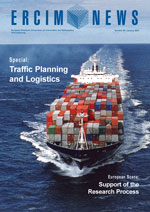by Constantine Stephanidis and Jessica Michel
In order to attract and foster trans-disciplinary research excellence, research programmes need to be defined around new grand challenges or key technological issues that are significant to economic growth or are derived from major societal drivers. Such programmes should be exploring visionary research themes that demand breakthroughs in basic research and engineering, and will be investigating radically new uses for technology.
Following the very successful Coordination Action 'Beyond the Horizon', the purpose of the newly launched EU Coordination Action 'InterLink' is to promote collaboration and partnerships in a number of strategic research areas in future and emerging Information and Communication Technology (ICT). InterLink aims at advancing Europe's knowledge in these areas, at promoting European solutions and knowledge worldwide, and at influencing the way in which research in these areas will evolve internationally. It will therefore carry out activities and provide means and support mechanisms to encourage cooperation between European and non-European research communities in strategic basic research areas related to Information Society Technology (IST).
Three thematic areas have been carefully selected. These are based on the need to address both the evolution of the information society in the next ten to fifteen years, and the challenges this will impose on research in computing, software engineering, cognition and intelligence. These thematic areas, which are also closely linked to ERCIM's areas of strength, are:
1) Software intensive systems and new computing paradigms: the continuing decrease in the cost of microprocessors and storage is leading to the development of increasingly distributed and decentralized systems. Society's dependence on software-intensive systems is increasing rapidly, both in the economic sector and in daily life. Applications will be assembled as dynamic federations of autonomous and evolving components. In this context, new computing paradigms and techniques are required to build software-intensive systems.
2) Ambient computing and communication environments: the evolution of the information society is characterized by the development of personalized individual and collective services. These exploit infrastructures situated in smart environments and are based on a range of ubiquitous and pervasive communication networks that provide ambient computing at multiple levels. The underlying vision of pervasive and ambient computing assumes very large numbers of 'invisibly' small computing devices embedded in the environment. Such devices would interact with multiple users in a wide range of dynamically changing situations, and be supported by an infrastructure of intelligent sensors (and actuators) embedded in the built environment. The realization of this vision requires advances in various areas of ICT, and necessitates highly multidisciplinary research.
3) Intelligent and cognitive systems: cognitive systems should be able to interpret data arising from real-world events and processes, acquire situated knowledge of their environment, act, make or suggest decisions, and communicate with people on human terms. The design of cognitive artificial systems requires coordinated and integrated research efforts that span a wide range of disciplines and require collaborative resources that can be achieved only through long-term, multidisciplinary research activities.
The main aims of InterLink in the three selected thematic areas are:
-
to identify and address world-scale, basic research problems of an emerging global information and knowledge society, where significant added value is expected to be gained from world-wide cooperation
-
to establish communication and cooperation mechanisms within and beyond Europe in order to support the formation and functioning of a related scientific community
-
to identify complementarities in the selected areas between EU and other involved countries that could give rise to exchanges of knowledge and technology
-
to define joint basic research agendas, outlining research priorities and defining roadmaps and joint Research and Technological Development (RTD) initiatives.
InterLink is based on three working groups, one for each thematic area, that will work in a coordinated fashion. Working groups will consist of international teams of researchers with internationally recognized expertise in their fields of research. To support the Working Groups in conducting their work, advanced communication tools will be provided, aiming at a global networking of research communities. Several workshops will be organized during the project to foster RTD dialogue and promote interaction within each Working Group. Ultimately, InterLink will lead to the elaboration of a technology roadmap on an international scale in each thematic area.
The opening workshop for InterLink will take place from 10-12 May in the South of France (most likely in Nice, Antibes or Cannes). Detailed information will be available on the InterLink web site.
Link:
http://interlink.ics.forth.gr/
Please contact:
Constantine Stephanidis (scientific coordinator)
ICS-FORTH, Greece
E-mail:
Jessica Michel (administrative coordinator)
ERCIM office
E-mail: jessica.michel![]() ercim.org
ercim.org










